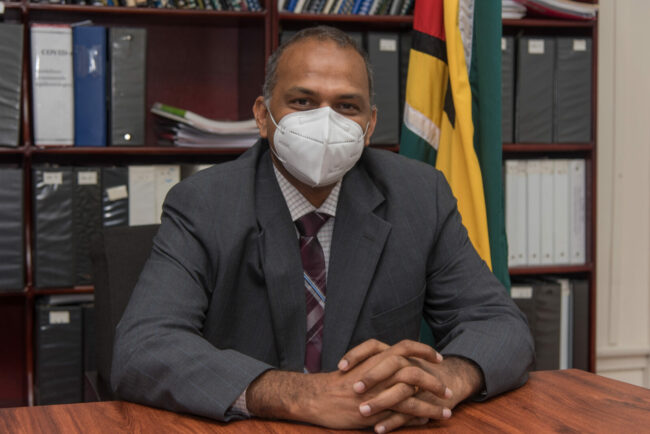With the first Monkeypox case being confirmed in Guyana over the last 24 hours, protocols previously established by the Ministry of Health have now fallen into place.
This assurance was given by Health Minister, Dr Frank Anthony during the COVID-19 update on Tuesday.
The minister reiterated that there is no need for panic, explaining that the health ministry is prepared to effectively contain the virus.
“Generally, when you had outbreaks, of Monkeypox, it’s more confined to West and Central Africa, where it’s endemic. But it’s quite unusual that you had this big spread across the globe. [However], having seen… the WHO declaring that it’s a public health emergency, we immediately took a number of steps here in Guyana,” Dr Anthony said.

Government begun preparation by ensuring health officials, including laboratory technicians receive specialised training, as well as sourcing the equipment for diagnosis, containment, and treatment of the virus.
“So… if you’re going to have a disease, you’re going to have to have a means of diagnosing that disease. We do so by building our laboratory capacity to be able to diagnose,” he said.
He made reference to the recent Monkeypox training conducted by the Pan American Health Organisation-World Health Organisation (PAHO/WHO) in Jamaica, which engaged persons around the Caribbean on the detection and laboratory diagnosis of Monkeypox.
During the training, participants received hands-on instruction in molecular detection –real-time polymerase chain reaction (PCR) – of the virus that causes Monkeypox, and reviewed detection and diagnosis in the context of preparedness and response to potential outbreaks.
National laboratories in the Caribbean were set to receive polymerase chain reaction (PCR) primers and probes for the testing of the Monkeypox virus.
Guyanese specialists who received training also trained others upon their return.
“So, we have capacity to be able to detect the virus. We also made sure that we bought the relevant laboratory equipment, so if we have to run the tests, we have that capability of running the tests,” Minister Anthony said.
He assured that diagnosing Monkeypox is effective and thorough, as it includes medical background checks of the patient, and preliminary diagnosis of the virus.
“Of course, we have to take samples from the patient, and once we take those samples, we send it to the lab. The lab would run the tests, and once the test confirms that this person is infected, there is a protocol that we implement,” the minister noted.
The protocol includes proper isolation of the infected person, and reaching out to other persons they may have been in contact with.
Asked about the possibility of persons contracting both Monkeypox and COVID-19, the minister said likelihood is rare; but physicians responsible for diagnosing these conditions would be on the lookout for such combinations, and treat them as necessary.“We have developed clinical guidelines on how to manage these patients… We had an expert group that came up with the guidelines of management, so I don’t think the physicians would [face difficulty] if they had a complicated case,” Dr Anthony said.
To date, over 42,000 cases of Monkeypox have been confirmed worldwide.


